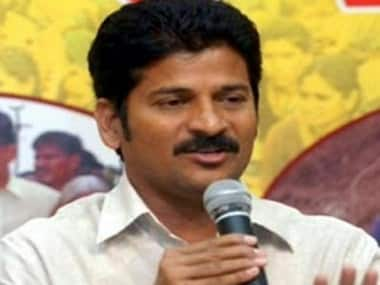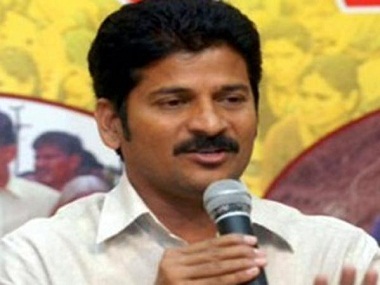Wonder of wonders from the not-scarce-for-news Telangana: An MLA of one party was caught allegedly red-handed handing over Rs 50 lakh to another MLA for the latter’s vote in the on-going Legislative Council elections. The MLA caught was Telugu Desam Party’s Revanth Reddy who believed he had struck a deal with Elvis Stephenson, an MLA nominated by the governor – read government – to pay Rs five crore for his vote. The Telugu Desam Party was a few votes short of getting one of its nominee through and was out for any vote it could get. Given the rivalry between the Telangana Rajya Samiti (TRS) run by K Chandrashekar Rao and TDP’s Chandrababu Naidu, buying a vote to prevent that would seemingly be the natural thing in that nascent state’s politics. [caption id=“attachment_2272932” align=“alignleft” width=“380”]
 Ibnlive image[/caption] “ACB Director General A. K. Khan told journalists later that a trap was laid for Mr. Reddy. on the basis of a written complaint by Mr. Stephenson after two days of negotiations between them.” The Hindu
reported
. He was later remanded to 14-days in custody. Elections to the state councils are like the Rajya Sabha’s where members are elected to six-year terms on a rotational basis every two years. But they differ in one aspect. The Council’s constituencies are of three kinds – the MLAs, local bodies – civic to panchayat samitis – and teachers as well as graduates spread over regions. For the Rajya Sabha, only all MLAs vote. Prima facie, it appears a case of bribery was attempted and thwarted but it is quite possible that the thwarting was encouraged to show up the Telugu Desam in bad light. However, there are perhaps no parties that can be considered clean on this ground. At one time or the other, they may have lured voters with inducements like they do the ordinary voters – cash per vote, biryani and alcohol too in some cases, and freebies post-elections. The story from Hyderabad is yet to play out fully because there would be the issue of carrying the case to its logical end, of supporters of the TDP vehemently denying the alleged misdeeds, and a lot of dramatics. When several MLAs of the same Assembly were suspended recently for a term for disrespecting the national anthem, they had protested instead of apologising, and courted arrest. Absurd dramatics is a staple of the Indian parliamentary democracy, as proven by the storming of the well and heckling of the speaker, so the people know they are doing the best, though such actions are contrary to the idea of law-making by debate and vote. It’s seen more often in Parliament now and in legislatures too, where even violence substitutes argument. Accepting bribes is considered normal in politics. To get things done, some persuasion, especially in the form of money, helps. It helps politicians get richer and make the next round of elections more expensive. We know of voters being bribed in a variety of ways – cash at the individual level and freebies promised at the party level. We also have heard how voters are bought in elections to the Council as well as the Rajya Sabha, especially when margins are thin and stakes are high. Most cross voting is ensured by buying the vote. Often the bribe-giver considers the bribe given as a business expense, and here the word ‘business’ is used advisedly. Here, the deal was arrived at a whopping Rs 5 crore, perhaps unheard of in legislative history. In a long journalistic career, I have heard of bribes that did not go beyond a few lakhs – unless it has been indexed to inflation – and that too for promises of offices like chairmanship of corporations owned by the government. In TDP’s case, such a lure in kind was not possible because the TRS is in power and the TDP is no position to offer such an inducement. These inducements take long to materialise as MLAs know, and they prefer to search for other options. But a politician, especially an elected politician, offering a bribe to another who is perhaps new to the ways, and therefore perhaps found it repugnant, comes as a shocker.
Ibnlive image[/caption] “ACB Director General A. K. Khan told journalists later that a trap was laid for Mr. Reddy. on the basis of a written complaint by Mr. Stephenson after two days of negotiations between them.” The Hindu
reported
. He was later remanded to 14-days in custody. Elections to the state councils are like the Rajya Sabha’s where members are elected to six-year terms on a rotational basis every two years. But they differ in one aspect. The Council’s constituencies are of three kinds – the MLAs, local bodies – civic to panchayat samitis – and teachers as well as graduates spread over regions. For the Rajya Sabha, only all MLAs vote. Prima facie, it appears a case of bribery was attempted and thwarted but it is quite possible that the thwarting was encouraged to show up the Telugu Desam in bad light. However, there are perhaps no parties that can be considered clean on this ground. At one time or the other, they may have lured voters with inducements like they do the ordinary voters – cash per vote, biryani and alcohol too in some cases, and freebies post-elections. The story from Hyderabad is yet to play out fully because there would be the issue of carrying the case to its logical end, of supporters of the TDP vehemently denying the alleged misdeeds, and a lot of dramatics. When several MLAs of the same Assembly were suspended recently for a term for disrespecting the national anthem, they had protested instead of apologising, and courted arrest. Absurd dramatics is a staple of the Indian parliamentary democracy, as proven by the storming of the well and heckling of the speaker, so the people know they are doing the best, though such actions are contrary to the idea of law-making by debate and vote. It’s seen more often in Parliament now and in legislatures too, where even violence substitutes argument. Accepting bribes is considered normal in politics. To get things done, some persuasion, especially in the form of money, helps. It helps politicians get richer and make the next round of elections more expensive. We know of voters being bribed in a variety of ways – cash at the individual level and freebies promised at the party level. We also have heard how voters are bought in elections to the Council as well as the Rajya Sabha, especially when margins are thin and stakes are high. Most cross voting is ensured by buying the vote. Often the bribe-giver considers the bribe given as a business expense, and here the word ‘business’ is used advisedly. Here, the deal was arrived at a whopping Rs 5 crore, perhaps unheard of in legislative history. In a long journalistic career, I have heard of bribes that did not go beyond a few lakhs – unless it has been indexed to inflation – and that too for promises of offices like chairmanship of corporations owned by the government. In TDP’s case, such a lure in kind was not possible because the TRS is in power and the TDP is no position to offer such an inducement. These inducements take long to materialise as MLAs know, and they prefer to search for other options. But a politician, especially an elected politician, offering a bribe to another who is perhaps new to the ways, and therefore perhaps found it repugnant, comes as a shocker.
Mahesh Vijapurkar likes to take a worm’s eye-view of issues – that is, from the common man’s perspective. He was a journalist with The Indian Express and then The Hindu and now potters around with human development and urban issues.
)